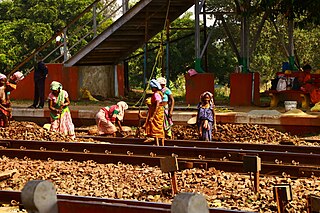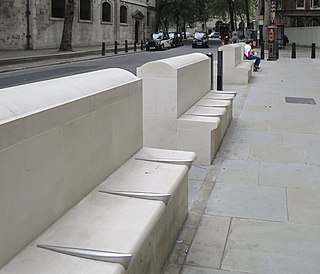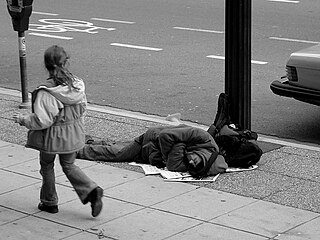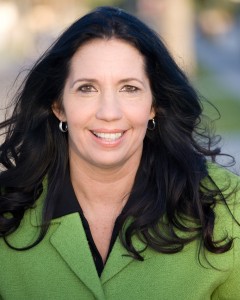Related Research Articles

The war on poverty is the unofficial name for legislation first introduced by United States President Lyndon B. Johnson during his State of the Union address on January 8, 1964. This legislation was proposed by Johnson in response to a national poverty rate of around nineteen percent. The speech led the United States Congress to pass the Economic Opportunity Act, which established the Office of Economic Opportunity (OEO) to administer the local application of federal funds targeted against poverty. The forty programs established by the Act were collectively aimed at eliminating poverty by improving living conditions for residents of low-income neighborhoods and by helping the poor access economic opportunities long denied from them.

In the United States, the number of homeless people varies from different federal government accounts. In 2014, approximately 1.5 million sheltered homeless people were counted. In 2018, the Department of Housing and Urban Development estimated roughly 553,000 homeless people in the United States on a given night, or 0.17 percent of the population. Approximately 65 percent of people were sheltered in provided housing while 35 percent were unsheltered. Annual federal HUD reports contradict private state and local reports where homelessness is shown to have increased each year since 2014 across several major American cities, with 40 percent increases noted in 2017 and in 2019.

The working poor are working people whose incomes fall below a given poverty line due to low-income jobs and low familial household income. These are people who spend at least 27 weeks in a year working or looking for employment, but remain under the poverty threshold.

Social policy is a plan or action of government or institutional agencies which aim to improve or reform society.
Workfare is a governmental plan under which welfare recipients are required to accept public-service jobs or to participate in job training. Many countries around the world have adopted workfare to reduce poverty among able-bodied adults, however their approaches to execution vary. The United States and United Kingdom are two such countries utilizing workfare, albeit with different backgrounds.

The Personal Responsibility and Work Opportunity Reconciliation Act of 1996 (PRWORA) is a United States federal law passed by the 104th United States Congress and signed into law by President Bill Clinton. The bill implemented major changes to U.S. social welfare policy, replacing the Aid to Families with Dependent Children (AFDC) program with the Temporary Assistance for Needy Families (TANF) program.
The Kensington Welfare Rights Union (KRWU) is a progressive social justice, political action, and advocacy group of, by, and for the poor and homeless operating out of Philadelphia, Pennsylvania. The group was founded by six women, Alexis Baptist, Sandy Brennan, Diane Coyett, Cheri Honkala, Louis Mayberry, and Debra Witzman, and formed in Philadelphia's Kensington neighborhood in April 1991.

Social exclusion or social marginalisation is the social disadvantage and relegation to the fringe of society. It is a term that has been used widely in Europe and was first used in France in the late 20th century. It is used across disciplines including education, sociology, psychology, politics and economics.

Out of 10,000 female individuals 13 are homeless. Although studies reflect that there are many differences among women suffering homelessness and there is no universal experience, the average homeless woman is 35 years old, has children, is a member of a minority community, and has experienced homelessness more than once in their lifetime.
Court costs are the costs of handling a case, which, depending on legal rules, may or may not include the costs of the various parties in a lawsuit in addition to the costs of the court itself. In the United States, "court costs" are differentiated from attorney's fees, which are the hourly rates paid to attorneys for their work in a case. Court costs can reach very high amounts, often far beyond the actual monetary worth of a case. Cases are known in which one party won the case, but lost more than the monetary worth in court costs. Court costs may be awarded to one or both parties in a lawsuit, or they may be waived.

Vagrancy is the condition of homelessness without regular employment or income. Vagrants usually live in poverty and support themselves by begging, scavenging, petty theft, temporary work, or social security. Historically, vagrancy in Western societies was associated with petty crime, begging and lawlessness, and punishable by law with forced labor, military service, imprisonment, or confinement to dedicated labor houses.

In the United States, poverty has both social and political implications. In 2020, there were 37.2 million people in poverty. Some of the many causes include income inequality, inflation, unemployment, debt traps and poor education. The vast majority of people living in poverty are less educated and end up in a state of unemployment; higher incarceration rates have also been observed. Although the US is a relatively wealthy country by international standards, poverty has consistently been present throughout the United States, along with efforts to alleviate it, from New Deal-era legislation during the Great Depression, to the national war on poverty in the 1960s and poverty alleviation efforts during the 2008 Great Recession.

Homelessness or houselessness – also known as a state of being unhoused or unsheltered – is the condition of lacking stable, safe, and functional housing. People can be categorized as homeless if they are:

Discrimination against homeless people is the act of treating homeless people, or people perceived to be homeless, unfavourably. As with most types of discrimination, it can manifest in numerous forms.

Anti-homelessness legislation can take two forms: legislation that aims to help and re-house homeless people; and legislation that is intended to send homeless people to homeless shelters compulsorily, or to criminalize homelessness and begging.
The Cloward–Piven strategy is a political strategy outlined in 1966 by American sociologists and political activists Richard Cloward and Frances Fox Piven.

Criminology is the interdisciplinary study of crime and deviant behaviour. Criminology is a multidisciplinary field in both the behavioural and social sciences, which draws primarily upon the research of sociologists, political scientists, economists, psychologists, philosophers, psychiatrists, social workers, biologists, social anthropologists, as well as scholars of law.
The Homeless Bill of Rights refers to legislation protecting the civil and human rights of homeless people. These laws affirm that homeless people have equal rights to medical care, free speech, free movement, voting, opportunities for employment, and privacy. Legislation of this type is currently being debated at the state level in the United States. Over 120 organizations in five different states have shown public support for a Homeless Bill of Rights and are working towards its implementation. A Homeless Bill of Rights has become law in Rhode Island, Connecticut and Illinois and is under consideration by several other U.S. states, including California, Delaware, Minnesota, Missouri, Oregon, Tennessee, and Vermont.

Cheri Lynn Honkala is an American anti-poverty advocate, co-founder of the Kensington Welfare Rights Union (KWRU) and co-founder and National Coordinator of the Poor People's Economic Human Rights Campaign. She has been a noted advocate for human rights in the United States and internationally. She is the mother of actor Mark Webber.

Welfare fraud is the act of illegally using state welfare systems by knowingly withholding or giving information to obtain more funds than would otherwise be allocated.
References
- ↑ The criminalization of poverty.
- ↑ Pager, Devah; Goldstein, Rebecca; Ho, Helen; Western, Bruce (2022). "Criminalizing Poverty: The Consequences of Court Fees in a Randomized Experiment". American Sociological Review. 87 (3): 529–553. doi:10.1177/00031224221075783. S2CID 247038184.
- ↑ Herring, Chris; Yarbrough, Dilara; Marie Alatorre, Lisa (2019). "Pervasive Penality: How the Criminalization of Poverty Perpetuates Homelessness". Social Problems. doi:10.1093/socpro/spz004.
- ↑ Gustafson, Kaaryn (2008–2009). The Criminalization of Poverty. p. 643.